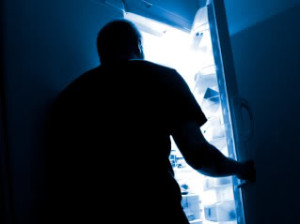- Calls to this hotline are currently being directed to Within Health or Eating Disorder Solutions
- Representatives are standing by 24/7 to help answer your questions
- All calls are confidential and HIPAA compliant
- There is no obligation or cost to call
- Eating Disorder Hope does not receive any commissions or fees dependent upon which provider you select
- Additional treatment providers are located on our directory or samhsa.gov
Defining Night Eating Syndrome Disorder

Many of us know the main eating disorder diagnoses – anorexia nervosa, bulimia nervosa, and binge eating disorder. However, beyond these, there are many disordered eating behaviors and potential diagnoses such as Night Eating Syndrome (NES) that are described under the “Other Specified Feeding or Eating Disorder” category of the Fifth Edition of the Diagnostic and Statistical Manual of Mental Illness (DSM-5).
Night eating syndrome is one of these disorders and approximately 1.5% of the US population, according to the National Institute of Mental Health [1].
Diagnosing Night Eating Syndrome
Night eating is considered to be a “clinical representation of a circadian imbalance,” AKA behavior resulting from an imbalance in one’s circadian (sleep-wake) cycle [2]. Essentially, the individual experiences hunger late into the evening, often eating at least a quarter of their daily calories after their dinner, waking up multiple times throughout the night to eat, or both [3].

“1) Morning anorexia and/or skipped breakfast four or more mornings per week
2) Presence of a strong urge to eat between dinner and sleep onset and/or during the night
3) Sleep onset and/or sleep maintenance insomnia four or more nights per week
4) Presence of a belief that one must eat to return to sleep
5) Mood is frequently depressed and/or mood worsens in the evenings [2].”
The disorder is different from sleep-eating in that the individual is awake when engaging in night eating behaviors. In fact, diagnostic criteria specify that they have awareness and recall of nocturnal eating episodes [2].
For diagnosis, these behaviors must also result in “significant distress and/or impairment in daily functioning for the individual [2].”
Finally, diagnostic criteria note that these behaviors must be occurring for at least 3 months and not secondary to “substance use or dependence, medical disorder, medication, and another psychiatric disorder [2].”
It is important to note that Night Eating Syndrome is not the same as binge eating disorder in that “ the amount of food consumed in the evening/night is not necessarily objectively large nor is a loss of control over food intake required [1].”
Causes
As with most mental illnesses, there is no one cause. These behaviors are often a combination of many different factors. For night eating syndrome, patterns have been found between high-achievers or college students and night eating, as they often engage in night eating due to their altered sleep/work schedules, and it becomes a more serious habit.

Another factor may be stress, as high levels of stress have shown to be correlated with night eating. No matter the cause, night eating can have serious impacts on an individual’s daily life functioning as well as their mental health.
If any of the behaviors above sound familiar to you, reach out to a therapist, your doctor, or an eating disorder support organization for more information.
References:
[1] Unknown (2019). Night Eating Syndrome. Walden Behavioral Care, retrieved from https://www.waldeneatingdisorders.com/popular-searches/night-eating-syndrome-nes/. [2] Gallant, A. R., Lundgren, J., Drapeau, V. (2012). The night eating syndrome and obesity. Obesity Reviews, 13, 528-536.About the Author:

As a freelance writer for Eating Disorder Hope and Addiction Hope and a mentor with MentorConnect, Margot is a passionate eating disorder advocate, committed to de-stigmatizing these illnesses while showing support for those struggling through mentoring, writing, and volunteering. Margot has a Master’s of Science in Clinical Mental Health Counseling from Johns Hopkins University.
The opinions and views of our guest contributors are shared to provide a broad perspective on eating disorders. These are not necessarily the views of Eating Disorder Hope, but an effort to offer a discussion of various issues by different concerned individuals.
We at Eating Disorder Hope understand that eating disorders result from a combination of environmental and genetic factors. If you or a loved one are suffering from an eating disorder, please know that there is hope for you, and seek immediate professional help.
Published January 7, 2020, on EatingDisorderHope.com
Reviewed & Approved on January 7, 2020, by Jacquelyn Ekern MS, LPC
